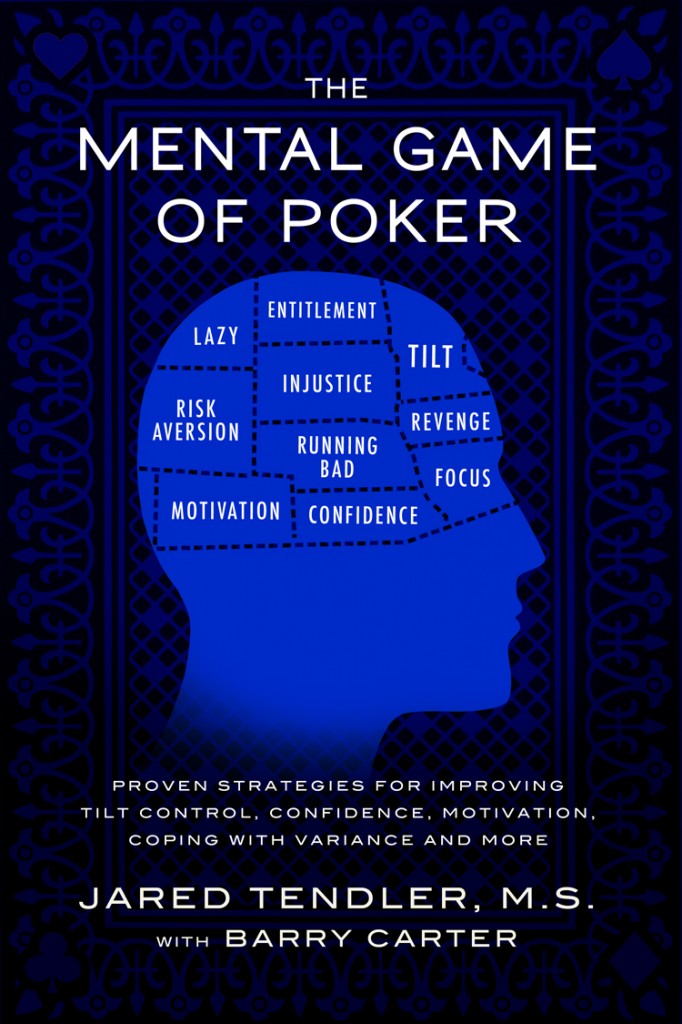Previous part of the book “Mental Game of Poker”: Bad Card Tilt
5.2.1 Focusing on Results More Than Quality
In the last decade, poker has evolved at a tremendous pace. Part of the reason for this rapid evolution can be attributed to players shifting their focus from results to quality. Since this is a relatively new concept for most players (you've probably heard players say, “it's better to be lucky than good”), you can hear them saying that focusing on results is bad, but they can't help themselves when a losing streak hits.
Focusing on the quality of play is a skill that follows the rules of the Adult Learning Model (ALM). However, players often make the mistaken assumption that performing a results-oriented action (e.g., checking the money balance during the game) means that no progress has been made in focusing on quality. It is impossible to accurately determine subtle positive skill improvements if you don't document everything on paper or have a photographic memory. And when you only care about the final result, you miss smaller signs of improvement, such as increased recognition, less frequent balance checking, reduced irritation, greater focus on quality, or more hands reviewed after the session.
Every time a losing streak hits, you have the opportunity to prove how much you've improved. Only when skills manifest under strong emotional pressure can you see what has been learned to the level of unconscious competence. Everything else is still in the learning process.
INSERT LOGIC: SKILLS DETERMINE EVERYTHING; YOU'RE JUST NOT BEING REWARDED PROPERLY AT THE MOMENT.
IF SKILLS DETERMINE EVERYTHING IN THE LONG RUN, THEN IN THE SHORT RUN, YOU NEED TO FOCUS ON SKILLS.
5.2.2 Creating a Win
When a bad streak lasts, there's a desire to end the session while you're still ahead and thus finish the day without losses. During bad periods, you generally forget what winning feels like, so you can create a winning session for yourself to regain the feeling of victory, earn some money, and avoid another painful losing session. Creating a win (along with playing at lower limits or fewer tables) is advice offered by traditional poker wisdom when failures affect your confidence.
So, is creating a win good? Or should you just keep playing, knowing that if you maintain good play quality, everything will eventually be fine?
The answer: it depends on the circumstances. Your goal as a poker player is to assess the risk. Two things you need to consider before making a decision:
- Creating a win is a good choice if your confidence has dropped, and it's clear that you're playing poorly. Create a win for yourself if you feel crushed and can't remember the last time you won. When your edge has diminished to a minimum or disappeared entirely (tilting), continuing to play is a waste of money. If creating a win can boost your confidence and get you back on the winning track, then do it. Just know that this is a temporary tactic that doesn't solve confidence issues in the long run. If you don't directly address this problem, it will resurface the next time a losing streak hits. Don't let your confidence waver every time; better read Chapter 8 on how to build stable self-confidence.
- Continue playing if you know you're better at handling tilt and can control it. Forcing yourself to play even 10 minutes longer trains mental muscles, strengthens poker skills, boosts confidence, and helps eliminate deeply rooted tilt causes.
5.2.3 Poker and Life Balance
A prolonged losing streak can start affecting your personal life. It becomes difficult to leave poker aside, losses affect your mood, you avoid socializing with friends, don't want to engage in any activities, and it becomes increasingly hard to concentrate, sleep, and enjoy your free time. For some players, one session is enough for poker to start interfering with their personal life.
A good way to prevent poker from affecting your life is to create a protective bubble. The following steps will help you leave poker aside so it doesn't interfere with your life. Here's a strategy that has helped many players:
- Vent by writing on paper or on a computer. Most people vent incorrectly. They direct it at others or themselves. Instead, vent everything on paper or a computer to get the thoughts out of your head and create a description of the things that annoy you in poker. Essentially, you are documenting fresh information. You don't need to do anything with this information; just get it out of your head with the intention of analyzing your tilt once you calm down and can look at everything objectively. It's okay if you need a break before writing, but it would be good to start writing no later than a couple of hours later.
- Note technical and psychological poker mistakes after the session. You don't need to do a very detailed analysis; just note certain hands, game dynamics so that you can work more effectively on your weaknesses in the future. It will be easier if you note relevant hands during the session.
- Take a break. Up to this step, you've done everything you could. Apart from relaxing, there's nothing more you can do to improve your game. You can't change what happened, but you can use it to gain a better understanding of technical and psychological issues to become a better player in the future. You've done everything in steps 1 and 2; now it's time to relax and let your thoughts and mood recover.
- Get poker out of your head or write down thoughts about it on paper. It's likely that thoughts about poker will bother you even after completing the first three steps. If this happens, try to push them out of your head by focusing more on what you're doing at the moment. If those thoughts persist, then write them down on paper.
Although thinking about poker might not be what you want to do right after a bad session, it's a great way to get rid of oppressive thoughts about poker.
5.2.4 Predictable Failures
A losing streak becomes even harder when your mind starts predicting losses in advance. You get dealt aces, and you immediately assume you'll lose. You catch a middle set on the flop, and your opponent check raises, and you immediately think he has the top set. Before the river card is revealed, you're a 20-1 favorite, but you already know there will be a suckout. This is a pre-made conclusion that you'll lose. You play just to find out how it will happen this time.
For some players, the ability to predict failure leads to thinking that bad beats happen because they constantly think about them. This illusion arises from not understanding that the mind predicts the future based on recent past events.
The mind, like the body, has the ability to sense the future. As you move, your body constantly makes certain predictions to be prepared. An example of such a prediction failing is when you climb stairs and don't pay attention to how many steps there actually are. If you expect a step that isn't there, you might stumble because the body's prediction was wrong.
A prediction, whether by the body or mind, is always made based on the information available at the time. When a losing streak hits, your mind draws data from a stream of information related to losing. So naturally, your mind predicts more losses. Conversely, when you're winning, you also see wins in the future because recent experiences suggest that this will continue.
Predicting bigger failures is a problem when:
- In despair and wanting to avoid losses, you start using bad tactics in the game.
- You believe that your predictions are factual reality.
Believing that your mind can influence results is an illusion unless you have some mystical powers (but then why are you reading this book?).
Tokia kontrolės iliuzija yra labai subtili ir giliai slypinti problema, kurią reikia spręsti. Išspręskite šią problemą ir nesėkmių prognozavimas nepridės papildomo pykčio, bei neįtakos jūsų priimamų sprendimų nesėkmių periodo metu.
ĮTERPIAMOJI LOGIKA: TU GALI KONTROLIUOTI SAVO REAKCIJAS Į GAUNAMAS KORTAS, TAČIAU NEGALI DARYTI ĮTAKOS PAČIAM PADALINIMUI.
5.2.5 Minčių atstatymas
Nesėkmių periodui užsitęsus, nuolatiniai susirėmimai su tiltą sukeliančiais dalykais pradeda varginti jūsų mintis. Kai tiltą sužadinančių įvykių dažnumas yra normalus, jūsų mintys gali būti atstatytos gerai išsimiegojus, pabuvus su draugais ar pasidarbavus sporto salėje. Tačiau kai tiltas kaupiasi diena iš dienos, tampa vis sunkiau atstatyti mintis ir sugrįžti prie žaidimo švaria galva. Vakarykštės dienos tiltas užsilieka galvoje, padidėja tikimybė, kad tiltinsite vėl. Jeigu anksčiau reikėdavo 5 bad beatų, kad priversti jus susierzinti, tai dabar vienas priartina tiltą, o po antro visiškai pametate kontrolę.
Jūsų protas turi iškęsti per daug pykčio, todėl tas pyktis kaupiasi. Papildomas pyktis slegia jus ir gali priversti kuriam laikui sustoti žaisti pokerį, tam kad galėtumėte atstatyti mintis. Kai kuriems žaidėjams tai reiškia keletą dienų be pokerio ir vien jau tai gali būti tilto priežastimi.
Jeigu nenorite daryti pertraukos, turite pašalinti tą susikaupusį pyktį, su kuriuo jūsų smegenys negali natūraliai susidoroti. Tai galite padaryti šiais būdais:
- Vadovaukitės žingsniais, pateiktais „pokerio ir gyvenimo balansas“ skyriuje, tam, kad atitrauktumėt pokerį nuo savo gyvenimo.
- Naudodamiesi pirmajame priede pateiktais patarimais, mokykitės nusiraminimo praktikos.
- Vadovaukitės visais žingsniais aprašytais „susikaupę emocijos“ skyriuje.
Minčių atstatymas bloguoju periodu nėra tik šiaip sau graži idėja. Tai yra tai, kas padeda išlaikyti gerą žaidimą, tuo metu kai viskas nesiseka.







